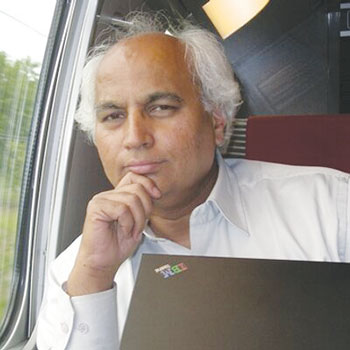
Sudheendra Kulkarni was aide of former prime minister Atal Bihari Vajpayee (1999-2004) and currently the Mumbai-based founder of Forum for South Asia
“The Age of Nations is past. The task before us now, if we would not perish, is to shake off our ancient prejudices, and to build the Earth.” — Pierre Teilhard de Chardin (1881-1955)
The global Covid-19 pandemic ought to have united the world as never before. It has caused severe disruption of economies and livelihoods in countries and communities around the world, and precipitated the worst global public health crisis since the outbreak of the Spanish flu a century ago. Thus far (July 3), the total number of Covid positive cases worldwide has almost touched 11 million and the number of deaths 523,177. Of the total global fatalities, the US accounts for 131,423, while in India, the toll has crossed 18,000. In Mumbai, the coronavirus has claimed as many lives (4,632) as in all of China (4,634).
According to conventional wisdom, people unite when confronted with danger or calamity. Therefore, faced with twin crises — a deadly health pandemic and consequential debilitating economic crisis — the global community should have united in multiple acts of cooperation and solidarity. Unfortunately, the very opposite is happening. Unity is nowhere in sight. Despite being led by Antonio Guterres, a great global citizen, the United Nations is paralysed. The world’s richest country, led by an unworthy president, first maligned the World Health Organisation and then withdrew from it altogether.
The world’s two largest economies — USA and China — which should have become allies in a common war against the pandemic, have on the contrary, begun an ominous new Cold War. “De-coupling” is the bellicose new word guiding this slugfest. Global value chains are being recklessly disrupted, just when the international community urgently needs to strengthen global cooperation links.
Closer home, our accursed South Asian neighbourhood has fared no better. The last word in the acronym SAARC stands for ‘cooperation’. But what cooperation can there be within an organisation sunk in a coma? Even though prime minister Narendra Modi has called for SAARC nations to join together to fight the coronavirus pandemic, there is little cooperative action on the ground. How can there be?
Modi has refused to attend SAARC summits for the past four years, since it is now Islamabad’s turn to host it. Meanwhile, Pakistan’s prime minister Imran Khan has blamed India for the terror attack on the Karachi Stock Exchange, even as the Indian government continues to point accusing fingers at Pakistan for the continuing terrorist attacks in Kashmir. Moreover, guns of the two armies have not stopped firing across the line of control (LoC). All this is happening when the Covid-19 induced lockdown has worsened people’s suffering on both sides of the border. When the visible virus of mutual hate is so uncontrollably active, what hope is there for our two countries joining forces to combat the invisible virus?
Equally depressing are border skirmishes between the other two giant Asian neighbours — indeed, the only two countries in the world with billion-plus populations. Don’t India and China have an obligation to set a good example to the rest of the world? And isn’t that obligation greatly enhanced by their being inheritors of the wisdom of two of the world’s oldest and richest civilisations? If our Upanishads proclaimed vasudhaiva kutumbakam, exactly the same noble sentiment was affirmed, over 2,000 years ago, in the ancient Chinese classic Book of Rites — “wise people take the whole world as one family.”
All this wisdom was dumped into the barren depths of the Galwan Valley when leaders of India and China failed to put a timely stop to the murderous confrontation between their soldiers on the ‘line of actual control’ in Ladakh, resulting in the brutal death dance on the night of June 15. We don’t know yet when, and how, this standoff will end. Already, war mongering ‘strategic experts’ in both neighbour countries are urging their governments to “exercise the military option” to defend “our territory, national pride, and national sovereignty”. There is very little discussion on joint research to develop a viable vaccine against the coronavirus or mutual cooperation against the threat of future pandemics. What we hear instead is the shrill demand to ‘de-couple’ India-China ties.
There’s no doubt our planet is entering a dangerous period in global history because of the rise of virulent national exclusivism the world over. Before the Covid crisis struck, there was an air of optimism about the emergence of a smaller, inter-connected and inter-dependent new world order because of new technologies, trade and unprecedented human mobility. But dark forces residing in the collective unconscious of humanity have conspired to sabotage global unity and cooperation necessary to build a safer and healthier world for our children. One hopes that wiser counsel prevails and we re-discover the wisdom of our civilisations.
Other articles by Sudheendra Kulkarni: